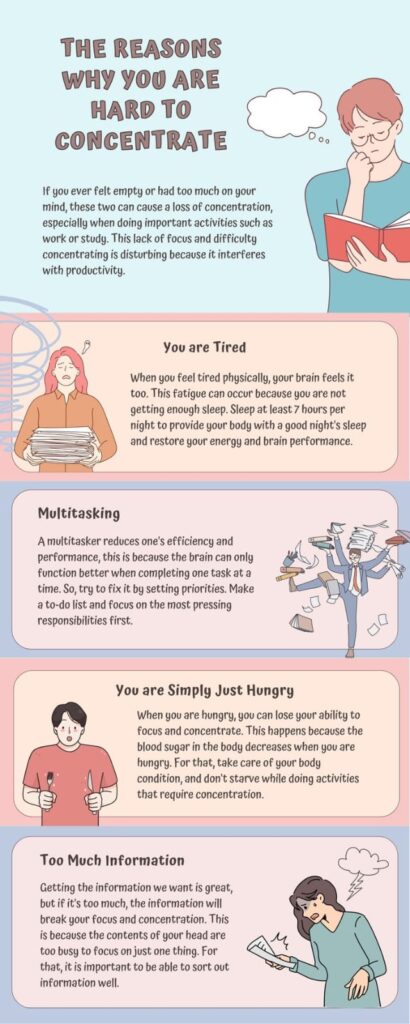You want to study… but your brain just won’t lock in. You sit down with the best of intentions. You open your book. Maybe you even set up your space to minimize distractions. But within minutes, your eyes drift. Your mind wanders.
Suddenly, you’re checking your phone, staring into space, or scrolling without meaning to. It’s frustrating. You want to focus. You want to get things done. But no matter how hard you try, something keeps pulling you away. Then comes the guilt. The self-blame.
That sinking feeling that maybe you’re just lazy or undisciplined. But here’s the truth: it’s not your fault. This isn’t about weakness or willpower. It’s not that you’re lazy. It’s that your brain is trying to survive in a world that constantly demands your attention.
From buzzing notifications to endless content feeds, everything is designed to pull your focus in a hundred directions at once. Modern life has rewired our brains to crave stimulation, to avoid boredom, and to jump from one thing to another.
In that kind of environment, trying to concentrate on one task—especially a slow or difficult one—can feel impossible. And that’s why we need a new approach. If you’re struggling to focus, you’re not broken. You’re human. And the good news? Focus isn’t a rare gift.
It’s a trainable skill. In the sections that follow, we’ll break it down—why focus is so hard, and how you can rebuild it. Step by step. Starting with understanding how your brain really works.
It’s Not You—It’s Your System
If you’ve ever blamed yourself for not being able to focus, you’re not alone. Most people think it’s a willpower problem. That if they just tried harder, they’d get more done. But that’s not how the brain works. The truth is, it’s not about effort.
It’s about the system you’re operating in. Look around. Your phone pings every few minutes. Messages, news alerts, social media updates—always something new. Your laptop has ten open tabs. You switch between them without finishing anything.
Every screen, every app, every platform is designed to grab your attention—and keep it. This is no accident. These tools are built to hijack your brain. They play on your natural desire for novelty, connection, and reward.
Each time you check your phone or click on a new tab, your brain gets a tiny hit of dopamine. It feels good, so you keep doing it. Even when you don’t want to.
So, when you sit down to do something focused—like studying or working on a project—your brain struggles. Not because you’re weak, but because you’ve been trained to switch tasks constantly. You’re simply reacting the way any human would in a world full of distractions.
You’re not broken. You’re responding normally to a hyperstimulating environment. That’s why focus isn’t about forcing yourself to try harder. It’s about changing the conditions. Rewiring how your mind responds to the world. And it starts with understanding what’s pulling your attention—and why.
The Dopamine Trap
Dopamine is often called the brain’s “reward chemical.” It is a natural chemical messenger that helps us feel pleasure and motivates us to repeat activities that bring enjoyment or satisfaction.
When something good happens, like eating tasty food or winning a game, dopamine is released, giving us a small burst of happiness. Today, screens, social media, and fast content play a big role in how our brains use dopamine.
Every time we scroll through social media or watch a quick video, our brain gets a hit of dopamine. These activities are designed to give us instant rewards, like likes, comments, or funny clips.
This constant stimulation trains our brain to expect quick and easy pleasure all the time. Because of this, our brains start craving more frequent and intense dopamine hits. This makes slower, less exciting tasks feel boring or even painful.
Activities like reading a book, studying, or working on a project don’t give the brain immediate rewards. Without constant dopamine boosts, these tasks feel dull and hard to focus on. This leads to something called focus fatigue.
Our brain gets tired of waiting for the next dopamine hit. It struggles to maintain attention on tasks that require patience and deep thinking. Instead, it pushes us to seek new sources of quick pleasure, like checking our phones or jumping between apps.
Over time, this cycle makes it harder to concentrate on slow, meaningful work. We become restless and easily distracted. The dopamine trap keeps us chasing short bursts of excitement and avoids sustained focus.
Breaking free from this trap requires patience and practice. Reducing screen time, taking breaks, and training the brain to enjoy slower activities can help restore balance. In the end, understanding dopamine’s role is key to regaining focus.
It helps explain why modern digital life feels so addictive and why it can be hard to slow down and concentrate.

Your Focus Is a Muscle
Focus is like a muscle in your brain. Just like your body muscles, it can get stronger with regular training. But yelling at yourself or blaming yourself when you lose focus won’t help. In fact, it can make things worse by adding stress and frustration.
When you get upset with yourself for losing focus, your brain reacts with negative feelings. This makes it even harder to concentrate. Instead of yelling, think about building your focus like you build physical strength—with patience and consistency.
Every time you practice paying attention, you are exercising your focus muscle. Small efforts matter. Spending just a few minutes each day on focused tasks can make a difference over time. The key is to be gentle and persistent, not harsh or impatient.
Multitasking is like trying to lift weights incorrectly. It seems like you are doing more, but it actually weakens your focus muscle. When you switch between tasks rapidly, your brain has to reset each time.
This constant jumping drains mental energy and lowers your ability to concentrate deeply. Over time, multitasking trains your brain to be easily distracted. It becomes harder to hold attention on one thing.
Your focus muscle gets weaker, just like a muscle that never gets proper exercise. This makes tasks that need sustained attention feel exhausting and frustrating. To strengthen your focus, try single-tasking. Give your full attention to one thing at a time.
Set small time goals, like 10 or 15 minutes of uninterrupted work. Then gradually increase the time as your focus improves. Take breaks to rest your brain and avoid burnout. Remember, focus is a skill you can develop.
It takes time and care, just like building any muscle in your body. Being patient and consistent helps your brain grow stronger. Yelling or blaming only holds you back. Treat your focus with kindness and practice, and you will see progress.
Breath Is the Reset Button to Train Attention With Mindfulness
Breathing is something we do all the time without thinking. But mindful breathing is different. It means paying attention to your breath on purpose. A simple way is to inhale slowly and then exhale even longer.
For example, breathe in for four counts and breathe out for six or eight counts. This small change can have a big effect. When you breathe slowly and deeply, it sends a message to your nervous system. Your nervous system controls how your body reacts to stress.
Fast, shallow breathing can make you feel anxious or tense. But slow, calm breaths help shift your brain into a relaxed state. This relaxed state is important for focus. When your brain is calm, it can work better. You feel less overwhelmed and more clear-headed.
Mindful breathing helps reduce distractions and clears mental clutter. It acts like a reset button for your brain. Before starting any deep work or studying, taking a moment to focus on your breath can prepare your mind.
Even just one minute of mindful breathing can make a difference. It helps you settle in, calm racing thoughts, and improve your concentration. Try this now: sit comfortably, close your eyes if you want, and breathe in slowly through your nose. Count to four in your head.
Then breathe out gently through your mouth, counting to six or eight. Repeat this a few times. Notice how your body feels. Your shoulders may relax, and your mind may feel quieter.
This simple practice can be done anywhere—before a test, a meeting, or a tough task. It requires no equipment or special training. Over time, mindful breathing becomes easier and more natural. It builds a habit that helps you stay focused and calm in busy moments.
Remember, your breath is always with you. Use it as your reset button whenever you need to refocus and feel centered.
The Pencil Trick: Building Attention in 30 Seconds
Here is a simple exercise to boost your attention. It is called the Pencil Trick. Take a pencil and hold it in front of you. Look at the pencil for 30 seconds. Try not to let your eyes wander. Keep your gaze steady and focused.
This may sound easy, but it can be surprisingly challenging. Your mind will want to drift. Your eyes might want to look elsewhere. When that happens, gently bring your focus back to the pencil. Don’t judge yourself. Just return your attention calmly.
To make this exercise even better, combine it with breathwork. Before you start, take a few slow, deep breaths. Inhale slowly and exhale longer. This helps calm your nervous system and prepares your brain to focus.
Looking at the pencil while breathing mindfully trains your brain to stay present. It rewires your attention gently. With regular practice, your brain becomes better at ignoring distractions and sustaining focus.
You don’t need to spend hours on this. Just five minutes a day can lead to noticeable changes. Practice the Pencil Trick daily for a few weeks. You will start to feel more focused and less distracted.
This small habit can build your focus muscle over time. It trains your brain to stay calm and attentive in a simple way. Plus, it is easy to do anywhere — at home, in the office, or even on a break.
The Pencil Trick is a powerful tool. It shows how small, consistent actions can improve your attention. Try it today and see how your focus grows one moment at a time.
Real Results: Why This Works
Many studies show that simple focus and breath exercises really help. Students who practice mindful breathing and attention training often remember more. They complete homework faster and with less stress.
This is because their brains learn to block distractions better. For example, one study found that students who used focused breathing before studying scored higher on tests. They could concentrate longer and retain more information.
Another research showed that practicing attention exercises daily helped improve working memory. This means they could hold and use more information at once. Anecdotes from teachers and students confirm these benefits too.
Students say they feel less overwhelmed and more confident. They can finish tasks without constantly checking their phones or getting distracted. The key is consistency. These changes don’t happen overnight. But with regular practice, the brain rewires itself.
Focus improves step by step. Gradually, concentration becomes easier and more natural. The best part is that these techniques are simple and accessible. Anyone can start today. With patience and commitment, better focus and learning become inevitable. Real progress comes from small habits repeated daily.

Focus Is a Skill You Can Build
Focus is not something you are born with. It is a habit you can learn and build over time. If you struggle to focus, it does not mean you are bad at it. It means you have never been taught how to train your attention.
The good news is you can start right now. Begin with one simple breath. Slow, calm breathing helps reset your mind and prepares you to focus.
Next, try the pencil trick. Spend just five minutes today looking at a pencil without letting your eyes wander. Pair it with mindful breathing. These small steps train your brain gently and effectively.
Focus grows with practice. Be patient and kind to yourself. The more you practice, the stronger your focus muscle becomes. Start today. Your future self will thank you.
20 FAQs on “Why You Can’t Focus (Even When You Want To)”
What is dopamine and how does it affect focus?
Dopamine is the brain’s “reward chemical” that motivates us by creating feelings of pleasure. It affects focus by driving us to seek quick rewards, which can make slow tasks feel boring.
Why do screens and social media make it hard to focus?
They provide constant, fast dopamine hits that condition the brain to expect instant rewards, making it difficult to concentrate on slower, deeper work.
What is focus fatigue?
Focus fatigue happens when the brain becomes tired from trying to maintain attention, especially when it is used to quick dopamine bursts and constant stimulation.
Can focus really be trained like a muscle?
Yes! Focus is like a muscle that grows stronger with consistent, gentle practice and can be weakened by distractions or multitasking.
Why doesn’t yelling at myself help me focus?
Yelling or self-blame adds stress, which makes it harder for the brain to concentrate. Positive, patient practice works much better.
How does multitasking affect my ability to focus?
Multitasking weakens focus by forcing the brain to switch rapidly between tasks, which drains mental energy and reduces concentration over time.
What is mindful breathing and how does it help focus?
Mindful breathing involves slow, deep breaths, usually inhaling slowly and exhaling longer. It calms the nervous system and shifts the brain into a calm, focused state.
How long should I practice mindful breathing for it to be effective?
Even one to two minutes before a task can help reset your focus, but regular practice enhances benefits over time.
What is the Pencil Trick?
The Pencil Trick is a simple exercise where you look at a pencil for 30 seconds without letting your eyes wander to train your attention.
How often should I practice the Pencil Trick?
Daily practice of just five minutes can lead to measurable improvements in focus within a few weeks.
Can these focus techniques improve my memory too?
Yes, studies show that improving focus through breathwork and attention exercises also boosts memory and learning.
Why do slow tasks like reading feel painful after lots of screen time?
Because your brain craves fast dopamine hits, slow tasks seem boring and require more effort, leading to focus fatigue.
Is it normal to get distracted during focus exercises?
Absolutely. The key is to gently bring your attention back without judgment, which strengthens your focus muscle.
How long does it take to see real improvements in focus?
With consistent daily practice, most people notice improvements in a few weeks.
Can focus exercises help with anxiety and stress?
Yes, mindful breathing and attention training can calm the nervous system and reduce feelings of stress and anxiety.
Do I need any special tools to practice these techniques?
No. All you need is your breath and a simple object like a pencil for attention exercises.
Can children benefit from these focus exercises?
Yes, children can improve attention and reduce impulsivity with regular practice of mindful breathing and focus training.
What should I do if I lose focus during studying?
Pause, take a few mindful breaths, then return your attention gently to your task or try the Pencil Trick.
How does digital addiction relate to dopamine and focus?
Digital addiction provides constant dopamine hits, which train the brain to seek quick rewards and weaken the ability to focus on longer tasks.
What is the best way to start improving my focus today?
Start with one deep breath, then try the Pencil Trick for five minutes. Consistency and patience are key to building lasting focus.
~Authored by Ameya Satam





